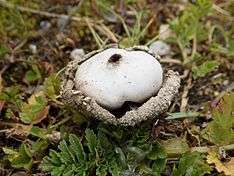Disciseda
Disciseda is a genus of gasteroid fungi in the family Agaricaceae. It is a widely distributed genus that is prevalent in arid zones.[4] Disciseda was circumscribed by mycologist Vassiliĭ Matveievitch Czernajew in 1845.[5]
| Disciseda | |
|---|---|
| Disciseda candida | |
| Scientific classification | |
| Kingdom: | |
| Division: | |
| Class: | |
| Order: | |
| Family: | |
| Genus: | Disciseda Czern. (1845) |
| Type species | |
| Disciseda collabescens Czern. (1845) | |
| Synonyms[1] | |
Species

Disciseda bovista
As of December 2015, Index Fungorum accepts 36 species in Disceida:[6]
- Disciseda africana (Har. & Pat.) Dring 1964
- Disciseda alpina Kreisel 1976
- Disciseda andina Speg. 1912
- Disciseda anomala (Cooke & Massee) G.Cunn. 1927
- Disciseda arida Velen. 1939
- Disciseda atra (Lloyd) Zeller 1947
- Disciseda australis G.Cunn. 1927 — Australia
- Disciseda bovista (Klotzsch) Henn. 1903
- Disciseda brandegei (Lloyd) Zeller 1947
- Disciseda calva (Z.Moravec) Z.Moravec 1958
- Disciseda candida (Schwein.) Lloyd 1902
- Disciseda castanea (Lév.) Bottomley 1948
- Disciseda cervina (Berk.) G.Cunn. 1927
- Disciseda circumscissa (Berk. & M.A.Curtis) Speg. 1912
- Disciseda collabescens Czern. 1845
- Disciseda compacta Czern. 1845
- Disciseda defodiodis (Lloyd) Zeller 1947
- Disciseda errurraga Grgur. 1997 — Australia[7]
- Disciseda hollosiana Henn. 1902
- Disciseda hyalothrix (Cooke & Massee) Hollós 1902
- Disciseda hypogaea (Cooke & Massee) G.Cunn. 1927
- Disciseda johnstonii (Lloyd) Zeller 1947
- Disciseda kaloola Grgur. 1997 — Australia[7]
- Disciseda kiata Grgur. 1997 — Australia[7]
- Disciseda levispora (Lloyd) Zeller 1947
- Disciseda luteola (Lloyd) Zeller 1947
- Disciseda macrospora Speg. 1921
- Disciseda minima Dring 1964
- Disciseda muelleri (Berk.) G.Cunn. 1927
- Disciseda muntacola Grgur. 1997 — Australia[7]
- Disciseda nigra Dörfelt & H.Nowak 2002
- Disciseda ochrochalcea Kreisel 1976
- Disciseda pedicellata (Morgan) Hollós 1902
- Disciseda pila R.E.Fr. 1909
- Disciseda singeri Z.Moravec 1954
- Disciseda subterranea (Peck) Coker & Couch 1928[8]
- Disciseda uplandii (Lloyd) Zeller 1947
- Disciseda verrucosa G.Cunn. 1926 — Australia; New Zealand
gollark: Well, ubq was promoted to owner.
gollark: Praise supreme overlord ubq323?
gollark: What if I don't want to? How do you know I know we know AutoBotRobot knows what that server is?
gollark: You don't know that.
gollark: Encrypted msgpack objects?
References
- "Synonymy: Disciseda Czern". Species Fungorum. CAB International. Retrieved 2014-07-14.
- Morgan AP. (1892). "North American Fungi. Fifth Paper". Journal of the Cincinnati Society of Natural History. 14 (3–4): 141–148. OCLC 469017376.
- Long WH. (1941). "Studies in the Gasteromycetes II. Bovistina, a new genus". Mycologia. 33 (3): 270–273. doi:10.2307/3754761. JSTOR 3754761.
- Kirk PM, Cannon PF, Minter DW, Stalpers JA (2008). Dictionary of the Fungi (10th ed.). Wallingford, UK: CAB International. p. 215. ISBN 978-0-85199-826-8.
- Czernajew BM. (1845). "Nouveaux cryptogames de l'Ukraine et quelques mots sur la flore de ce pays". Bulletin de la Société Impériale des Naturalistes de Moscou (in French). 18 (2): 132–157.
- Kirk PM. "Species Fungorum (version 23rd December 2015). In: Species 2000 & ITIS Catalogue of Life". Retrieved 2015-12-27.
- Grgurinovic CA. (1997). Larger Fungi of South Australia. Adelaide: State Herbarium of South Australia. pp. 635–646. ISBN 978-0-7308-0737-7.
- Coker, William Chambers; Couch, John Nathaniel (1928). The Gasteromycetes of the Eastern United States and Canada. Chapel Hill: University of North Carolina Press. pp. 141–142, Plates 80 and 118. OCLC 609160704.
This article is issued from Wikipedia. The text is licensed under Creative Commons - Attribution - Sharealike. Additional terms may apply for the media files.